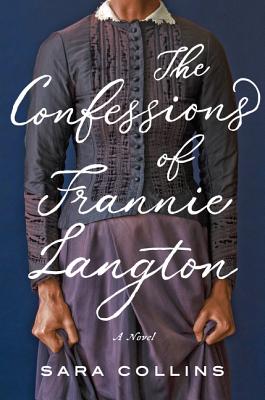
Amazon Affiliate Link | Bookshop.org Affiliate Link
This is not a happy book. It tells you that in the title already: the ‘confessions’ refer to Frannie’s written musings that she notes down while she is on trial for the murder of her employer and his wife–the latter of whom she happened to be in a romantic relationship with. Make sure to take note of the content warnings, and be ready for some gruesome scenes. All of this grimness does make for an appropriate setting to the troubles that Frannie is dealing with in the present moment of the story, but it can be overwhelming.
As Frannie recounts the events of her life that have led her to her current predicament, it takes a while for her supposed victims to take the stage, to the point I was becoming slightly impatient with the pacing. It opens with her life as a slave at the Langton plantation in Jamaica (which gave her the name she bears), where she was forced to serve her master as he carried out pseudo-scientific experiments with the aim to prove that African people were not human. That in itself is extremely horrific, and almost numbed me to the further events in the story. Of course, this history is important to understand–both in terms of general history and specifically for Frannie as a character. Still, even knowing that we are learning this history through the writings of Frannie herself, I couldn’t help but wish she would hurry up. Her lingering on this earlier part of her life creates a tense atmosphere, preparing the reader for all the awfulness to come, but this is an approach that either doesn’t work for me or I simply wasn’t in the mood for at the time.
Once Frannie arrives in London, her life becomes even more complicated. She is changed from a slave into a maid, as officially slavery was illegal in England at the time (ca. 1820). This is one of the main moments on which the story turns, where her plantation master gifts her to be employed by his friend, a practice that was still legal and is based on historical fact. It is in this position that she joins the Benham household and meets her employer and his wife (Madame Marguerite or Meg), as well as the other staff, who receive her with mixed feelings. It is also in this position that Frannie grows closer to Madame.
While I believe they both love the other at certain points in the narrative, I couldn’t say that they loved each other at the same time or even in the same way. Their relationship is so inherently shaped by inequalities: Frannie is black, of mixed race, a former slave, a maid, and on top of all that she is educated–which occasionally forces her into the position of sideshow. Madame is wealthy (through her husband), pretty, and of high society, though her being French seems to count as much as a mark against her as in her favour depending on the situation. Most complicated of all though, is the fact that the Benham wealth is generated through slavery, and this cannot ever be removed from the relationship between Frannie and Meg.
On top of all that, Meg has an opium habit that worsens over the course of the book, and she involves Frannie in covering it up so her husband won’t grow aware. There are so many secrets in this story, and the opium secret is an early indication of the bleakness that lives in the Benham marriage, creating another layer to the women’s relationship. It presents a theme often explored in historical fiction: while Madame seemingly has everything she could ever want (husband, wealth, beauty, youth), she either holds these things through her husband or her own age–which of course only ever advances in one direction. She is isolated and even needs drugs to numb the loneliness of her life. In one moment, Frannie suggests that white women are also the property of white men. Still, that doesn’t mean Meg and Frannie suffer the same pains, but the story does a good job of suggesting that the rules of society can protect as much as they can hurt and trap someone. Frannie and Meg just happen to be trapped in different ways.
In the end, these entrapments lead to the death of the Benhams and the imprisonment of Frannie, who is trying to figure out what happened that fateful night. The later chapters where she notes down the proceedings of her court case (all her writings are addressed directly to her lawyer, in the hopes that he can either figure out a defense or share her words, depending on the outcome of the case) come closest to feeling like a murder mystery. There are witnesses, evidence, a judge, and lawyers trying to make the best of it all. This is also where Frannie has a chance to figure out what she did (if anything), as her trauma seems to have blocked her memory. As she unravels the various threads being spun by the background characters in the court case, it becomes clearer to the reader how many more secrets lived in the Benham household, and you begin to question ever more what is and isn’t true.
Content warnings: slavery, prison, physical abuse, emotional manipulation, blood, gore, body horror, racism, suicide, murder, violence, miscarriage, rape mentions



